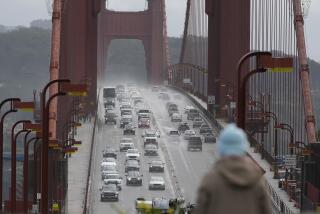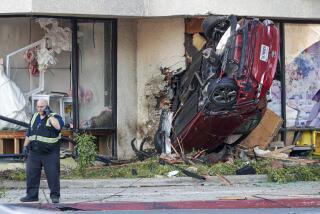Lock out drunk drivers? Bid includes 1st offenders ‘a sip over limit’
- Share via
All people convicted of drunk driving should have special ignition interlock devices installed on their vehicles that keep them from starting the car if they are intoxicated, federal safety regulators said Tuesday.
The National Transportation Safety Board said such a policy could be a major factor in preventing traffic collision deaths, especially those occurring in accidents caused by a wrong-way driver.
About 60% of wrong-way accidents involve an intoxicated driver, said NTSB Chairman Deborah Hersman.
Hersman said the interlock devices should be mandatory for all drunk-driving offenders, including first time convictions.
“The first step to address the number one killer on our roadways is to do what is proven to be effective -- use interlocks for all DWI offenders,” Hersman said.
An alcohol-ignition interlock is a device that prevents the engine from starting until the driver breathes into a device that measures alcohol content to see if it is lower than prescribed limits. Currently, 17 states require interlocks for first-time offenders.
“Technology is the game-changer in reducing alcohol-related crashes on our nation’s roadways,” Hersman said. “Achieving zero alcohol-impaired driving-related deaths is possible only if society is willing to separate the impaired driver from the driving task.”
The alcoholic beverage industry opposes a blanket requirement for first-time offenders, but it supports restrictions for people who have registered exceptionally high blood-alcohol levels.
Both the Distilled Spirits Council and the American Beverage Institute, which represents restaurant chains, support ignition interlocks for first-time convictions of people who posted a blood-alcohol content of .15 or higher.
A blood-alcohol level of 0.08 is generally considered the threshold for drunk driving.
“We believe that judges should be able to distinguish between someone who is one sip over the limit and someone has had nine drinks prior to driving. There should not be a one-size-fits-all penalty for DUI offenders,” said Sarah Longwell, managing director of the American Beverage Institute.
Longwell also said there is a considerable expense to enforcing low interlock mandates. She said that most of the states that have strict ignition interlock laws don’t enforce the regulations because of the cost.
The NTSB is making its recommendation even though traffic deaths, including those involving a drunk driver, have fallen steadily.
On Monday, the National Highway Traffic Safety Administration said overall traffic fatalities fell 1.9% to 32,367 in 2011. Roadway deaths have been falling steadily for some time, the agency said, and last year’s level represented a 26% decline from 2005.
Nationally, deaths in crashes involving drunk drivers dropped 2.5% in 2011, taking 9,878 lives, compared with 10,136 in 2010.
ALSO:
EPA to review Ford fuel economy data
Follow me on Twitter (@LATimesJerry), Facebook and Google+.
More to Read
Inside the business of entertainment
The Wide Shot brings you news, analysis and insights on everything from streaming wars to production — and what it all means for the future.
You may occasionally receive promotional content from the Los Angeles Times.











